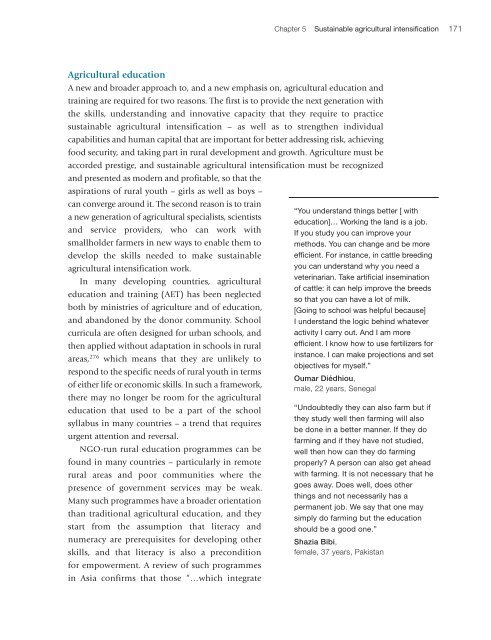English - IFAD
English - IFAD
English - IFAD
You also want an ePaper? Increase the reach of your titles
YUMPU automatically turns print PDFs into web optimized ePapers that Google loves.
Chapter 5 Sustainable agricultural intensification 171<br />
Agricultural education<br />
A new and broader approach to, and a new emphasis on, agricultural education and<br />
training are required for two reasons. The first is to provide the next generation with<br />
the skills, understanding and innovative capacity that they require to practice<br />
sustainable agricultural intensification – as well as to strengthen individual<br />
capabilities and human capital that are important for better addressing risk, achieving<br />
food security, and taking part in rural development and growth. Agriculture must be<br />
accorded prestige, and sustainable agricultural intensification must be recognized<br />
and presented as modern and profitable, so that the<br />
aspirations of rural youth – girls as well as boys –<br />
can converge around it. The second reason is to train<br />
a new generation of agricultural specialists, scientists<br />
and service providers, who can work with<br />
smallholder farmers in new ways to enable them to<br />
develop the skills needed to make sustainable<br />
agricultural intensification work.<br />
In many developing countries, agricultural<br />
education and training (AET) has been neglected<br />
both by ministries of agriculture and of education,<br />
and abandoned by the donor community. School<br />
curricula are often designed for urban schools, and<br />
then applied without adaptation in schools in rural<br />
areas, 276 which means that they are unlikely to<br />
respond to the specific needs of rural youth in terms<br />
of either life or economic skills. In such a framework,<br />
there may no longer be room for the agricultural<br />
education that used to be a part of the school<br />
syllabus in many countries – a trend that requires<br />
urgent attention and reversal.<br />
NGO-run rural education programmes can be<br />
found in many countries – particularly in remote<br />
rural areas and poor communities where the<br />
presence of government services may be weak.<br />
Many such programmes have a broader orientation<br />
than traditional agricultural education, and they<br />
start from the assumption that literacy and<br />
numeracy are prerequisites for developing other<br />
skills, and that literacy is also a precondition<br />
for empowerment. A review of such programmes<br />
in Asia confirms that those “…which integrate<br />
“You understand things better [ with<br />
education]… Working the land is a job.<br />
If you study you can improve your<br />
methods. You can change and be more<br />
efficient. For instance, in cattle breeding<br />
you can understand why you need a<br />
veterinarian. Take artificial insemination<br />
of cattle: it can help improve the breeds<br />
so that you can have a lot of milk.<br />
[Going to school was helpful because]<br />
I understand the logic behind whatever<br />
activity I carry out. And I am more<br />
efficient. I know how to use fertilizers for<br />
instance. I can make projections and set<br />
objectives for myself.”<br />
Oumar Diédhiou,<br />
male, 22 years, Senegal<br />
“Undoubtedly they can also farm but if<br />
they study well then farming will also<br />
be done in a better manner. If they do<br />
farming and if they have not studied,<br />
well then how can they do farming<br />
properly? A person can also get ahead<br />
with farming. It is not necessary that he<br />
goes away. Does well, does other<br />
things and not necessarily has a<br />
permanent job. We say that one may<br />
simply do farming but the education<br />
should be a good one.”<br />
Shazia Bibi,<br />
female, 37 years, Pakistan

















